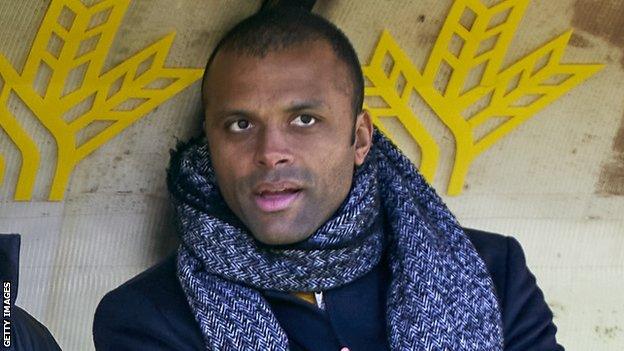PFA aims to make sure players are 'aware of their responsibilities' after Kurt Zouma incident
- Published

PFA chief executive Maheta Molango spoke before the committee on Tuesday
Football's players' union will work to make players aware of their responsibilities after a video emerged of Kurt Zouma hitting his cat pet.
West Ham "unreservedly condemned" Zouma, who kicked the cat across the floor and slapped it in the face.
Professional Footballers' Association's Geoff Thompson says education "plays a big part" in the PFA's remit.
He said: "The football ecosystem must look at players understanding their responsibility in influencing society."
"The role of social media, as we can see, can play a massive part both to the player and the area of society that may be influenced," PFA operational board chair Thompson told the Digital, Culture, Media and Sport (DCMS) select committee on Tuesday.
"It is about cultural education, it is about understanding the role and responsibility and when it's wrong, the PFA will communicate that.
"But player education plays a massive role in this particular instance and many instances where players are using social media. As we see, it's used against them, as well as highlighting indiscretions, and even positives."
Prior to the Zouma incident, a coalition of women's groups said the Football Association and Premier League must also improve players' education on consent and healthy relationships after recent high-profile police action in England involving professional footballers.
PFA chief executive Maheta Molango said the PFA "absolutely condemns any sort of violence and any domestic violence".
Thompson added that Molango is leading a "massive data project" designed to make players aware of their "roles and responsibilities as professional footballers".
Funds put into research 'paltry'
A report from the DCMS committee on concussion published in July was critical of the PFA and concluded that it, along with the Football Association, did not fight hard enough to address the issue over the past 20 years.
Earlier this month, a dedicated care department for former players living with neurodegenerative disease (NDD) was set up by the PFA.
The select committee said the FA was contributing £125,000 into research on the effects of heading the ball on concussion, and when asked if that figure was enough, Thompson said: "That's paltry, with all due respect.
"I think when you look at the economic activity of football, we have eminent research institutions in this country that could do justice and provide an investment that has an equivalence to our American counterparts, who are way ahead on this."
On the concussion issue, Molango said the PFA "does not need to wait for research to do something" and said the organisation is "absolutely" in favour of concussion substitutes.
"Research needs to be ongoing but, in the meantime, two things need to happen. The first is education and awareness," said Molango, who revealed he has committed to donating his brain to research "because it's important to lead by example".
"Players need to be made aware of what could be the potential risk associated with playing football and hence we are working together with a newly formed department to make training - just half an hour of proper awareness training - about potential risk linked to heading a football.
"The reality is while research is ongoing is people are suffering, and we as the PFA are pushing to get a support fund for people suffering with dementia."

'It belongs to all of us': Join us in celebrating 100 years of informing, educating and entertaining
From Sheffield to the Beijing mountains: Follow a group of Team GB freestylers in their preparations for the 2022 Winter Olympics
